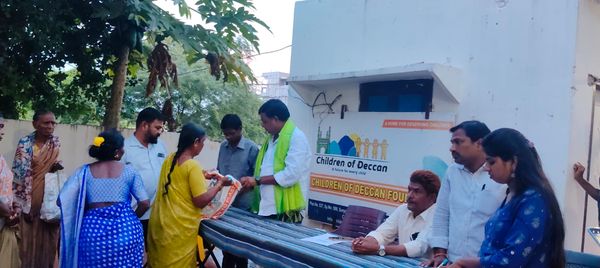NEWS & EVENTS
APAL’s State Committee in Telangana in collaboration with Sri Sharada Seva Trust organized a heartwarming initiative to distribute essential commodities
On 13th October 2024, APAL’s State Committee in Telangana in collaboration with Sri Sharada Seva Trust organized a heartwarming initiative to distribute essential commodities (ration) to 50 leprosy-affected families residing in the Shantinagar Leprosy Colony and Santosh Nagar Colony. This charitable effort reflects the trust’s ongoing commitment to uplifting marginalized communities and supporting those in need.
The ration distribution was led by the Chief Trustee, P. Sharada Garu, along with other dedicated members of the trust, including Sri Lakshmi, Prasulamba, Bhavani Prasad, Thyagaraju, Dakshina Murthy, and Praveen. Their active involvement made the event meaningful and impactful for the beneficiaries.
Mr. Ramesh, APAL’s State Coordinator in Telangana, also graced the occasion with his presence. He praised the Sri Sharada Seva Trust for extending assistance to these disadvantaged communities. He expressed gratitude on behalf of people affected by leprosy living in the colonies, emphasizing how such acts of kindness foster a sense of belonging among residents.
Several elders from the colonies, including Mr. Samel, V. Dom Nik, Rahimatullah, J. Pullaiah, and Amrut Raj, participated in the event, adding a sense of community and solidarity. The trust members responded positively to the feedback and reinforced their commitment to continuing such initiatives in the future.
The event not only provided essential support to the leprosy-affected families but also highlighted the importance of compassion, care, and unity in addressing social challenges.
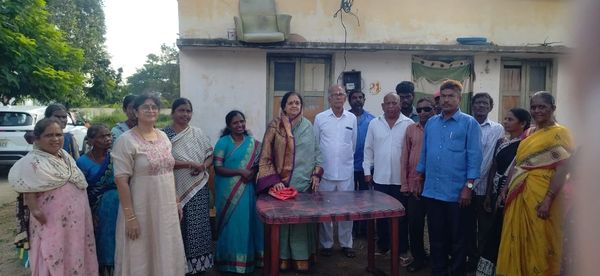
Mrs. Maya Ranavare had the distinguished privilege of serving as the chief guest at the 150-year celebration of The Leprosy Mission
On the 7th of October 2024, Mrs. Maya Ranavare had the distinguished privilege of serving as the chief guest at the 150-year celebration of The Leprosy Mission (TLM) in Maharashtra. This significant event, hosted at the historic HIL project, brought together prominent dignitaries from Maharashtra and Karnataka, underscoring TLM’s pivotal role in combatting leprosy in India. Mrs. Ranavare’s presence underscored her dedication to health initiatives and advocacy for the well-being of communities affected by leprosy. In her address, she lauded TLM’s relentless efforts over the past 150 years, highlighting the remarkable accomplishments that have positively impacted numerous lives and advanced leprosy awareness, treatment, and rehabilitation.
The event was graced by key TLM members and government officials, including the Additional Joint Secretary of Maharashtra and Dr. Kanule, whose collective support has been instrumental in advancing the mission’s objectives. Senior TLM leaders, Ms. Tina and Dr. Jaya Deepa, also played a pivotal role in the festivities, showcasing the organization’s extensive influence and sharing compelling narratives of resilience and recovery among patients. Their presence alongside the TLM teams from Karnataka and Maharashtra symbolized a unified front, collaborating closely with government representatives to reaffirm their dedication to eliminating leprosy and ensuring the social and economic inclusion of affected individuals.

In Gandhi Gram Post Ashram, Motipur, there is a group of 40 leprosy patients, all of whom are ration cardholders and depend on assistance to obtain essential rations
On 7th October 2024, In Gandhi Gram Post Ashram, Motipur, there is a group of 40 leprosy patients, all of whom are ration cardholders and depend on assistance to obtain essential rations. These individuals, due to their particular circumstances, receive their ration supplies based on verification of identification by Vikas Mitra, a community-level facilitator appointed to assist marginalized groups. Unlike the standard procedure for ration distribution, these ration cardholders are exempt from the usual KYC (Know Your Customer) process, as their identification and entitlement verification rely solely on Vikas Mitra’s confirmation. While effective for these patients, this setup deviates from the broader ration distribution system.
To formalize this arrangement and ensure its continuity, all the cardholders recently submitted a memorandum through the M.O. and B.D.O. (Block Development Officer) of Motipur. The initiative was spearheaded by Someshwar Dubey, APAL’s State Coordinator in Bihar, who advocated for the interests of the leprosy-affected group. This memorandum seeks official recognition of the current distribution method, enabling them to continue accessing rations without the need for KYC. In response, local authorities have pledged to forward the memorandum to the district administration. Any requisite directives will be issued at the district level to institutionalize this arrangement, thereby ensuring uninterrupted access to essential rations for these patients.
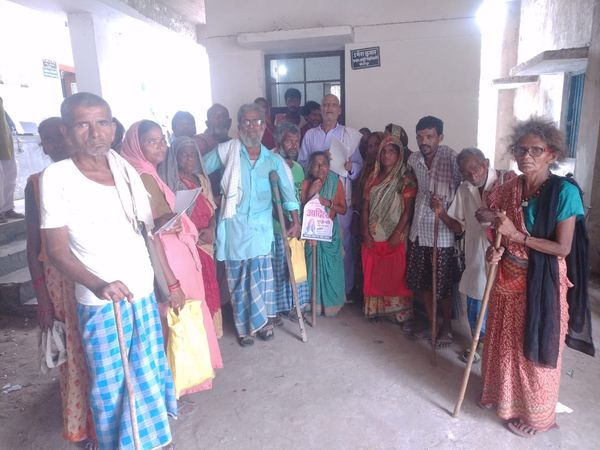
Mr. Madhusudan Tiwari, representing the APAL’s State Committee in Jharkhand, and his team from the Association of People Affected by Leprosy (APAL), formally submitted an application to the Deputy Commissioner of Dhanbad district
On October 5, 2024, Mr. Madhusudan Tiwari, representing the APAL’s State Committee in Jharkhand, and his team from the Association of People Affected by Leprosy (APAL), formally applied to the Deputy Commissioner of Dhanbad district under the Pradhan Mantri Awas Yojana (PMAY) scheme. This initiative is aimed at providing permanent housing for 627 families residing across 16 leprosy colonies within the district. The PMAY scheme, a flagship program of the Indian government, is dedicated to offering affordable and safe housing for underprivileged citizens. Through this application, APAL seeks to ensure that these families, many of whom have faced social stigma and economic challenges due to their conditions, can access secure and dignified living conditions, a fundamental need and a long-overdue right.
The application underscores the urgent need for permanent housing for these communities, which have often been marginalized and lack adequate access to basic amenities. By facilitating this process, Mr. Tiwari and APAL aim to uplift the affected families, offering them a stable foundation that fosters self-reliance and a sense of belonging within society. It is anticipated that the Deputy Commissioner will respond positively, recognizing the importance of inclusive development. If successful, this endeavour will not only enhance the living standards of these families but also reaffirm their rightful place in society, reinforcing the government’s commitment to social equity and housing for all.
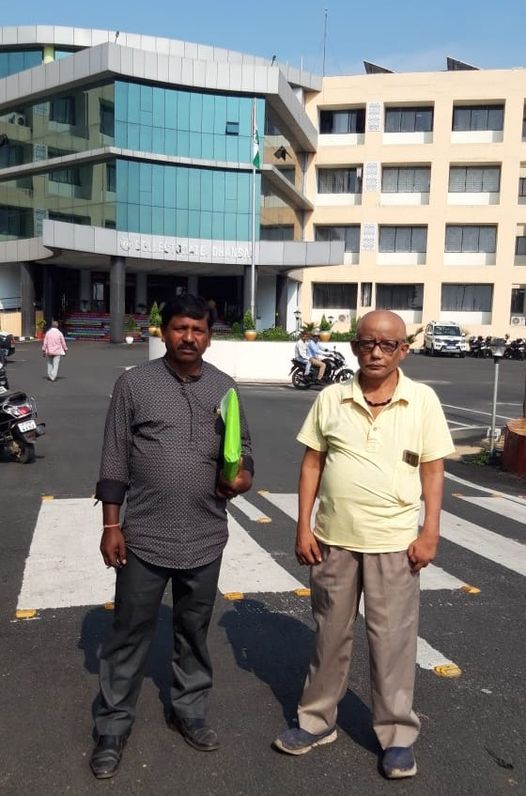
APAL State Committee, led by State Coordinator M. Ramesh, orchestrated a significant humanitarian endeavor aimed at providing assistance to families impacted by leprosy in Shanthinagar Colony, Peddamberpet. This endeavor, which entailed the distribution of essential groceries
On the 5th of October 2024, the APAL State Committee, led by State Coordinator M. Ramesh, orchestrated a significant humanitarian endeavor aimed at providing assistance to families impacted by leprosy in Shanthinagar Colony, Peddamberpet. This endeavor, which entailed the distribution of essential groceries, was executed in collaboration with the Society of Rural Development (SRD), an organization dedicated to uplifting underprivileged communities and ensuring access to necessities for those in need. The initiative served as a crucial support system for these families, who often encounter social stigma and economic hardships due to their condition.
The teams from APAL and SRD distributed food supplies to 28 families, ensuring that each household received adequate rations to sustain them. This distribution of groceries not only addressed immediate needs but also represented a compassionate gesture that underscored the commitment of APAL and SRD to the welfare of leprosy-affected communities. Through such outreach, M. Ramesh and the team aimed to provide relief and demonstrate solidarity with individuals affected by leprosy, reinforcing a sense of dignity and inclusion within the broader community.
This collaborative initiative underscores the impact of organizations like APAL and SRD in rural and marginalized areas. By addressing food security concerns for these families, APAL’s State Committee and its coordinator are contributing to a broader societal objective of breaking the cycle of neglect and stigma often associated with leprosy. Through these actions, they aspire to create a more inclusive and empathetic society, paving the way for a future where all individuals, regardless of their circumstances, can access basic resources and lead dignified lives.
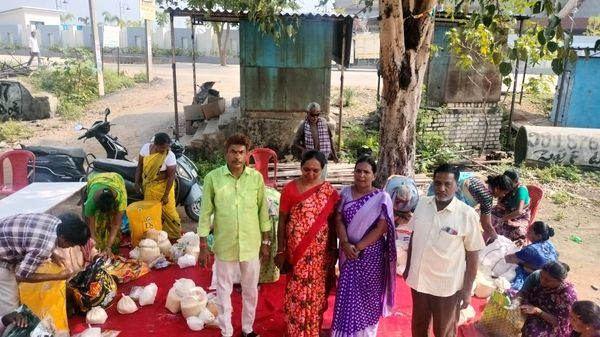
This compassionate initiative took place at Santhi Nagar Colony, a locality where many individuals impacted by leprosy reside. During the event, essential supplies such as food grains, clothes, and blankets were distributed to 100 people
On 4th October 2024, APAL’s State Committee in Telangana, in collaboration with Sai Seva Samiti, organized a significant humanitarian effort aimed at supporting individuals affected by leprosy in Hyderabad. This compassionate initiative took place at Santhi Nagar Colony, a locality where many individuals impacted by leprosy reside. During the event, essential supplies such as food grains, clothes, and blankets were distributed to 100 people, helping to alleviate some of the hardships they face in their daily lives. Volunteers from Gandhinagar, Musheerabad, and Secunderabad came together for this noble cause, ensuring that those in need received the necessary resources to improve their quality of life.
APAL extends its heartfelt gratitude to Sai Seva Samiti for their invaluable service and dedication to supporting individuals affected by leprosy. Their active involvement in the distribution of essentials is a testament to their commitment to community welfare and service. Additionally, APAL would like to offer special thanks to Mr. Ramesh, the State Coordinator for Telangana, for his continuous and significant contributions to this cause. His tireless efforts in coordinating such initiatives have been instrumental in ensuring that those affected by leprosy receive the care and assistance they need. This collaborative endeavor highlights the importance of unity in service, bringing hope and relief to a vulnerable community.
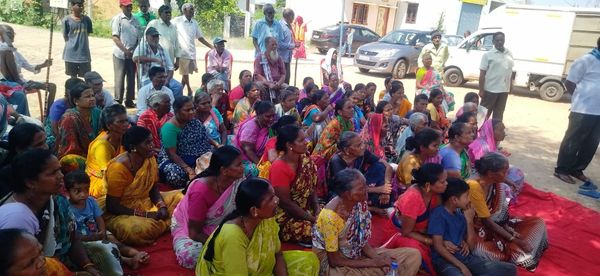
In collaboration with the Schieffelin Institute of Health – Research & Leprosy Centre, Karigiri, the APAL’s State Committee in Andhra Pradesh orchestrated a Health Screening Camp
On 3rd October 2024, In collaboration with the Schieffelin Institute of Health – Research & Leprosy Centre, Karigiri, the APAL’s State Committee in Andhra Pradesh orchestrated a Health Screening Camp at the Ananth Sayanam, Jyothi, and Anand Leprosy Colonies in Tirupati, Andhra Pradesh. The camp aimed to deliver vital health services to individuals affected by leprosy, with a focus on ulcer care, eye care, and the provision of aids and appliances. Moreover, essential medications were distributed to enhance the residents’ quality of life. A significant outcome of the camp was the identification of a pressing need for a Reconstructive Surgeon (RCS) to manage complications arising from leprosy, as three new cases requiring specialized reconstructive surgery were identified. These individuals also required MCR (Microcellular Rubber) footwear and various aids to facilitate their daily lives. The primary objective of the camp was to provide comprehensive healthcare, ensuring that those affected by leprosy receive the necessary support to improve their overall well-being.
APAL expresses sincere gratitude to Dr. Jerry and the entire team from the Schieffelin Institute for their exceptional services during the camp. Their dedication and medical expertise significantly alleviated the suffering of those impacted by leprosy, particularly in the Leprosy Colonies, where their compassionate care has brought renewed hope to the residents. APAL also acknowledges and deeply appreciates the substantial contributions of Mr. Sayilu, Mr. Prakash, and Mr. Danunjay Naidu from the APAL State Committee. Their relentless efforts in organizing and coordinating the camp were pivotal to its success, ensuring that the affected individuals received the care and support they needed. Their commitment to the cause of leprosy care and rehabilitation has had a profound impact on the community, fostering a sense of hope and empowerment among those affected by the disease.
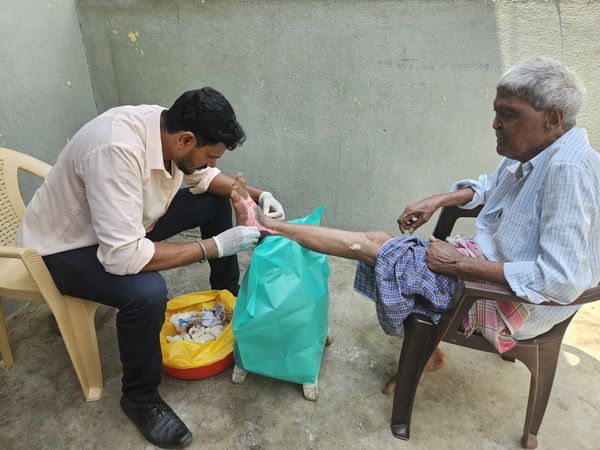
State Committee in Telangana, in partnership with the LEPRA Society, hosted a significant Disability Prevention and Medical Rehabilitation (DPMR) Camp
On 3rd October 2024, On the occasion of Mahatma Gandhi Jayanthi, the APAL’s (Association of People Affected by Leprosy) State Committee in Telangana, in partnership with the LEPRA Society, hosted a significant Disability Prevention and Medical Rehabilitation (DPMR) Camp. This event took place at Shanthi Nagar Colony in Rangareddy District, demonstrating a strong commitment to social welfare and community health. The primary objective of the camp was to address the medical requirements of individuals affected by leprosy, providing a platform for disability prevention and rehabilitation. With the collaboration of local stakeholders, this endeavour exemplified Gandhiji’s vision of equality, health, and inclusion for all, particularly for marginalized communities.
The camp received substantial support from Mr. M. Ramesh, the State Coordinator of APAL in Telangana, whose leadership and dedication played a crucial role in its success. Under his guidance, the DPMR Camp offered essential medical services, rehabilitation support, and preventive care to those in need. Through the partnership with the LEPRA Society, a renowned organization in the leprosy and healthcare field, APAL’s State Committee ensured that individuals affected by leprosy in Shanthi Nagar Colony received appropriate treatment and support. This initiative not only advanced the well-being of the community but also furthered the mission of raising awareness about leprosy and preventing disabilities associated with the disease.
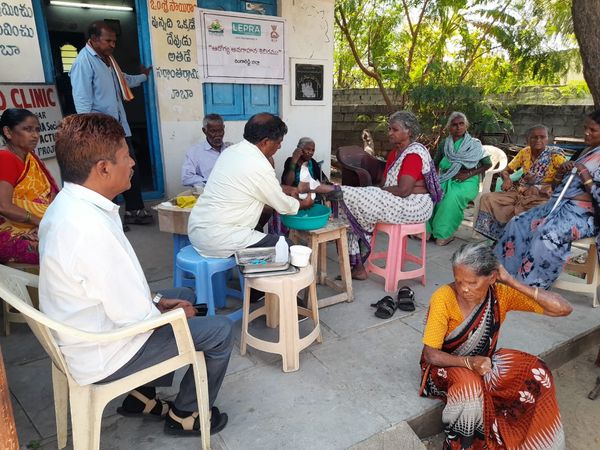
State Committee in Haryana, in partnership with the Leprosy Society and Rotary Club in Rohtak, conducted a compassionate distribution drive in all leprosy colonies throughout the state
On the 2nd of October 2024, in observance of Gandhi Jayanti, the APAL (Association of People Affected by Leprosy) State Committee in Haryana, in partnership with the Leprosy Society and Rotary Club in Rohtak, conducted a compassionate distribution drive in all leprosy colonies throughout the state. This initiative encompassed the distribution of MCR (Micro Cellular Rubber) footwear, essential for individuals affected by leprosy, as well as the provision of food grains to the residents, ensuring their comfort and well-being.
The event underscored the benevolent endeavours of the Leprosy Society and Rotary Club members, whose invaluable support significantly contributed to the success of the initiative. The festivities within the colonies cultivated a sense of inclusivity and concern within the leprosy-affected community, epitomizing the ideals of Mahatma Gandhi, who ardently advocated for equality and dignity for all.
APAL expresses profound gratitude to the Rotary Club members for their altruistic service. Special acknowledgement is also extended to Mr. Govind Swamy and the executive members of APAL for their devoted and proactive contributions to the community. Their relentless efforts persist in uplifting the lives of individuals affected by leprosy, promoting dignity and solidarity within society.
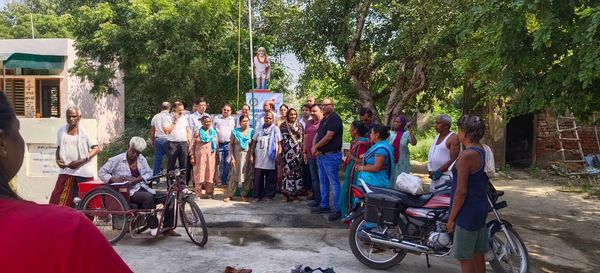
In furtherance of this initiative, Councilor Vijender Reddy distributed essential ration supplies to the residents of Shantinagar Leprosy Colony and Santosh Nagar Colony
On the 1st of October 2024, the Children of Deccan Foundation organized a special event to commemorate the International Day of Older Persons. Malkanna, the Foundation’s Chairman, spearheaded the program to recognize and provide assistance to the elderly population. In furtherance of this initiative, Councilor Vijender Reddy distributed essential ration supplies to the residents of Shantinagar Leprosy Colony and Santosh Nagar Colony, highlighting the Foundation’s dedication to assisting underprivileged communities, particularly those who have been marginalized due to age, health, or social circumstances. Apart from Malkanna and Councilor Reddy, the event witnessed the participation of other prominent figures. Mr. Ramesh, the State Coordinator of APAL, and Samuel, the leader of the Colony, lent their support to the cause. At the same time, Pooja played a pivotal role in ensuring the seamless execution of the program. Collectively, they emphasized the significance of providing care and resources to the elderly and vulnerable populations, advocating for the dignity and rights of older persons and individuals affected by leprosy, especially those contending with illnesses and residing in challenging conditions.
